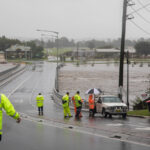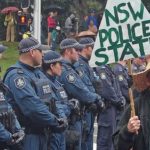New NSW Police Commissioner: All Talk, No Action

There is mounting pressure on newly appointed NSW Police Commissioner Karen Webb to make good on her promises to reform the culture of unaccountability and lack of transparency within the force, including changes to support victims of domestic violence offences.
Domestic violence inaction
Now, four months into the top job, the Commissioner has remained remarkably quiet about whether there will be fresh initiatives to deal with the domestic violence epidemic gripping the state.
This is despite repeated criticism from victims’ support groups and the recent publication of a report by the NSW Auditor-General which shows that the state’s police have allocated far less resources per capita than other states when it comes to domestic violence, often show little empathy or support towards victims, and that many officers have been allowed to remain on the force despite being convicted of domestic violence offences and having current apprehended violence orders against them.
“Under-resourced, ill-equipped,” are excuses we have heard for far too long. Children, in particular, are being placed in harm’s way, and very little appears to be done about it.
Every day there are stories in the media, or on social media about the failings of NSW Police – to spot the warning signs, to provide adequate assistance to victims in need, or more alarmingly, failing to investigate allegations of abuse, when there is more than enough evidence for them to do so.
A case in point
One example is the tragic story of a young boy who lives in the care of his mother in New South Wales. The mother was awarded full time custody of this boy by the Family Court of Australia despite allegations of her abusing the child, and a body of evidence to support that allegation.
The boy has suffered five permanently injured discs in his neck and bruising to most parts of his body. He told other adults in his extended family that his mother tried to strangle him.
Despite reports to Police by these concerned family members, the matter has never been properly investigated, even though there are medical records which detail the injuries the involvement of the Joint Child Protection Response Program (JIRT) – a team of workers from NSW Police, Department of Communities and Justice (DCJ, formerly FaCS) and NSW Health, who respond collaboratively to reports of serious child abuse.
The concerned family members who have no rights of residence or contact of the child, retained specialist family lawyers to pursue a case against the mother. A letter was also written to former Police Chief Mick Fuller who did not progress the matter further.
The boy’s biological grandfather, who had limited access to the child, committed suicide last year.
This is just one family desperately seeking help. For every one there are a dozen, two dozen, three dozen …. who knows how many more? In a similar situation, drowning and helpless in a broken system that is failing them time and time again.
Death of Hannah Clarke
Police have to work within the confines of the law. This was made crystal clear during the coronial inquest into the death of Hannah Clarke who was told by police when her increasingly erratic ex-partner abducted one of her children from a park on Boxing Day in 2019, just weeks before he killed the entire family by setting their car alight that there was “not a lot they could do” because her ex-partner had not broken the law.
There are real failings within the legislation itself as well as the way the family court system operates, often placing children in harm’s way, rather than removing them from danger.
But Police, usually, are the first responders in situations involving domestic violence and family abuse – they are the professionals who respond when a situation has turned violent. It makes sense then, that this is where a considerable amount of focus should be placed if we are to stem the tide of this horrific plague.
Auditor-General’s report
The recent report by the NSW Auditor General found other key failings within the NSW police response to domestic violence, aside from specialist resourcing, training and a lack of funding.
The report also found that the system used to record and manage domestic violence incidents was “cumbersome”, leaving police with less time to be working with victims, responding to callouts, and conducting investigations and interviews.
While this particular system is due to be replaced within four years, and this offers an opportunity for improvements to be made, it is a long time for victims to wait – many more could suffer serious injury or even death in the meantime.
The report also found that there were just six dedicated domestic and family violence policing policy staff expected to support 280 domestic violence specialists and advise 12,000 police officers across the state. Consider this against the statistics which show that NSW police respond to more than 140,000 domestic and family violence calls for assistance every year, and a context of annually increasing numbers.
The community calls are loud and clear and have been for a long time – we expect more from police – so that victims are identified early, supported and removed from risk as soon as possible. We also expect that accurate, meaningful records are kept for the purpose of subsequent investigations, should they be required.
And we most certainly expect that charges are laid when they should be so that serious matters involving allegations of abuse can be dealt with in the criminal courts, rather than remaining hidden within the Family Court.
Lack of accountability and transparency
More generally, police have long been criticised for the lack of accountability over their inaction when responding to crimes, as well as when they commit criminal offences themselves.
Less than 2% of complaints made against police officers in our state are investigated, as complaints are generally dealt with internally (by the Professional Standards Command) and the supposedly independent police watchdog – the Law Enforcement Conduct Commission (LECC) – is woefully under-resourced and has no power to discipline let alone criminally prosecute police officers. The body can only make recommendations in that regard.
Many believe this has led to a situation where police are effectively policing themselves – allowed to continue behaving badly and even committing crimes with impunity, including brutality towards citizens, and costing taxpayers tens of millions of dollars every year in the process.
The commissioning of Ms Webb led to hope of reform; but, sadly, it appears she may be the latest in a long line of ‘top brass’ enabling the culture of toxicity, inaction and even brutality to continue within our state.







